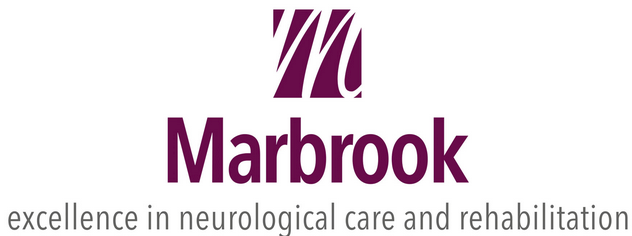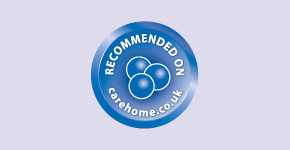Neurological Rehabilitation
Where a person chooses to go to for neurological rehabilitation and care can make a real difference to the speed of their recovery and their future life expectations.
If you are in need of any kind of rehabilitation you could not choose a finer place than the Marbrook Centre.
CQC Inspection Report 2018
At Marbrook we know that no two neurological injuries are alike, nor do they create the same challenges for the person or their families. At Marbrook there is no passive model of neurological care, real neurological rehabilitation is a team job, with each resident the most important member of that team.
Our neurological rehabilitation services are dynamic and progressive.
Rehabilitation is at the heart of everything we do and facilitated by a skilled, experienced multi-disciplinary team (MDT) of therapists, nurses and rehab coaches. Neurological care staff at Marbrook are passionate, courageous and committed to making a real difference.
What is a Neurological Condition?
Whatever our age or lifestyle, anyone at anytime can experience a neurological condition. In simple terms a neurological condition describes an adverse effect on our brain or nervous system, impairing our movement, our behaviour and our ability to communicate. This may occur suddenly, caused by a traumatic injury to our head or spinal cord or via a Stroke (please see our Stroke page) or maybe the long term effects of conditions such as Cerebral Palsy (a condition from birth), or condition that has developed during our lifetime such as Motor Neurone Disease or Multiple Sclerosis.
Such a broad spectrum of neurological conditions makes it very difficult to predict the exact timescales or effects any of these life changing incidents will have on our lives. Skilled and timely neurological rehabilitation and nursing care means for some of us the effects can be dramatically improved over quite short periods of time, for others, we will have to live with long term disability for the rest of our lives.
The Marbrook Centre multidisciplinary team are here to support you and your family on this new stage of your life. Life may have changed but it is not over.
A Centre designed for Neurological Rehabilitation
Marbrook’s award winning environment is tailored to meet the varied needs of those living with neurological conditions. Our well-equipped physiotherapy gym, transition training flat and the large number of domestic style rehab kitchens are key to supporting the ethos and culture of active rehabilitation. Our residential facilities are divided over two floors:
Eden on the ground floor
27 neurological rehab ensuite bedrooms
3 lounge diners with height adjustable rehab kitchens
2 bedroom transition training flat with independent access
Bray on the first floor
27 neurological rehab ensuite bedrooms (including those with piped oxygen)
3 lounge diners with height adjustable rehab kitchens
2 sheltered balconies overlooking the courtyard
Both floors have easy access to our hair salon and cinema room, as well as the dining court yard, gardens and sensory areas.
What makes our neuro rehab gym special?
Let David our Therapy Lead and Neuro Physio introduce you to some of our gym equipment, as he explains the benefits they can bring you in a proactive rehabilitation program.
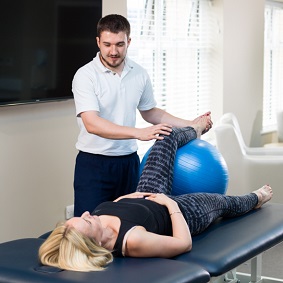
Our latest news
It’s Music To Our Ears…
The Marbrook Centre recently partnered with The Cambridge...
The importance of resident activities
At The Marbrook Centre we understand how important it is...
Lizzie talks to us about COVID prevention at The Marbrook Centre
We caught up with Lizzie, Project Coordinator at The...
The Marbrook Centre is making headway!
The Marbrook Centre team are delighted to announce that...
Meet Harley…
Meet Harley, dedicated and fun-loving Team Leader at The...
Do you need more information or have a question you would like to ask?
Call the Marbrook team: 01480 273 273
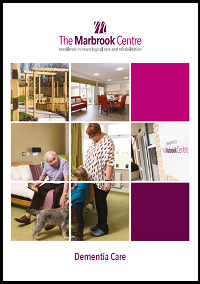
Download our Dementia
care brochure today to
find out more.
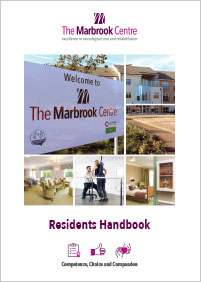
Download our residents handbook.
Neurological
We help to rehabilitate a wide range of conditions including:
Acquired Brain Injury (ABI)
Acquired Brain Injury (ABI) is a brain damaged by events after birth, rather than as part of a genetic or congenital disorder. Living with an ABI can result in cognitive, physical, emotional or behavioural impairments. It is estimated that at least a million people in the UK live with the effects of an ABI.
At Marbrook, our aim is to ensure people get the rehabilitation they need to lead the life they choose. We have a team of professional, caring and focused staff ready to support you to engage in your personal rehabilitation programme. Having a gym with the necessary equipment on site and our own physiotherapists, OTs, psychologists and rehab coaches means that rehabilitation is ongoing throughout the day, giving you the best opportunity to reach your goals.
Amyotrophic Lateral Sclerosis (ALS)
Please see Motor Neurone Disease for more information.
Brain Tumor
In the UK just over 9,000 people a year are diagnosed with a primary brain or central nervous system tumour. Not all tumours are malignant (cancerous) as they can be benign (non cancerous). Brain tumours are graded from 1 to 4 depending on their behaviour.
Benign brain tumours are graded low (1 or 2), meaning they are slow growing and less likely to return after treatment.
Malignant brain tumours are graded high (3 or 4) and can either be primary tumours (starting in the brain) or secondary tumours, having spread to the brain from elsewhere.
Compassion and support on an individual basis means we can be sure you get the right care at the right time from a team of passionate and professional staff. We include families and friends wherever possible to ensure your links with life outside of Marbrook are maintained. Well furnished ensuite bedrooms provide privacy, while facilities such as the cinema, gym and gardens are available too.
Cerebral Palsy
The therapeutic rehabilitation facilities we have at Marbrook are modern and designed to promote independence and personal goal setting. Our gym, cinema, single ensuite bedrooms, domestic style kitchens with adjustable height worktops and beauty salon support choice, wellbeing and independence. The skilled, compassionate and enthusiastic multi-disciplinary staff work with you to set your personal goals and to support and encourage you to reach them.
Creutzfeld-Jakob Disease (CJD)
CJD is a rare but sadly fatal condition that affects the brain with most people dying within a year of the symptoms starting. These symptoms include; a loss of memory and intellect, change of personality, slurred speech and loss of co-ordination and balance. There are four main types of CJD:
Sporadic CJD – although the most common form of CJD, the precise cause is still unknown. Most cases occur in older adults, with the average symptoms developing around 60-65 years of age. Sporadic CJD is still very rare in the UK, affecting only 1 or 2 in every million people in the UK.
Variant CJD – likely caused by consuming meat infected with Bovine Spongiform Encephalopathy (BSE – widely known as ‘mad cow disease’), although since the discovery of the link in 1996, strict rules now prevent such meat entering the food chain. Although the incubation period can be very long (over 10 years), there have only been 177 recorded case in the UK to date.
Familial or Inherited CJD – is a very rare genetic condition with the symptoms first developing in people in their 50s. It affects around 1 in every 9 million people in the UK.
Latrogenic CJD – is where the infection is accidently spread from someone living with CJD, via a medical or surgical procedure. However, due to increased awareness of these risks, Latrogenic CJD is now thankfully very rare.
There is no current cure for CJD.
If you have CJD we will support you to have the care that suits you best. We include your family and friends when possible, because they know you and, with your permission, can provide us with additional information about you, information that will help us to ensure you do things you enjoy. As well as having your bedroom with an ensuite bathroom, there are shared areas in Marbrook which offer quiet spaces or areas to be more active. The homely feel and accessible kitchens create a real sense of comfort and belonging.
Huntington’s Disease
Huntington’s was originally known as Huntington’s Chorea (from the Greek ‘chorea’ for dancing, because of the involuntary movements associated with the disease). Huntington’s is an inherited condition that progressively damages nerve cells in the brain, getting worse over time (normally over a 10–25 year time period). It can affect movement, cognition and behaviour. Features of Huntington’s include mood swings, personality changes, irritability and fidgety movements. A recent (2012) UK research program found 12 people per 100,000 in the population were affected by Huntington’s Disease.
We have staff with experience of working with people living with Huntington’s Disease, who understand the challenges and provide compassionate, person centred support. The facilities and staff at Marbrook make it possible to be as independent as possible, choosing what you want to do and having the support to do it.
Motor Neurone Disease (MND)
Motor Neurone Disease (MND) (also known as ALS – Amyotrophic Lateral Sclerosis) is a rare condition which progressively damages parts of the nervous system in the brain and spinal cord, stopping the motor neurones from working properly. Motor neurones control activities such as:
Walking
Speaking
Gripping
Swallowing
As the condition progresses, these activities become increasing difficult. In about 5% of cases there is some family history of MND, but currently it is not clear what causes the motor neurones from working.
The difficulties presented to someone living with MND are considerable. Due to the progressive nature of the disease, the individual will require increased levels of support, aids and personal care. The individual and their family benefit from knowing that all aspects of individual care needs are provided by a compassionate, dedicated, professional multi-disciplinary team. The Marbrook Centre has this. In addition we have a well designed and well equipped gym, individual ensuite bedrooms, outside space, large well furnished lounges, domestic style accessible kitchens, cinema, coffee lounge, and wifi coverage throughout the building. This means that use of technology and communicating via technology is made easier.
Multiple Sclerosis (MS)
In Multiple Sclerosis the protein myelin, which protects each nerve fibre in the brain and spinal cord, helping the electrical messages travel from the brain to the rest of the body, becomes damaged. These disrupted messages can cause a wide range of symptoms such as visual impairment (usually only in one eye), muscle stiffness and uncontrolled movement, ataxia (difficulties with co-ordination and balance) and fatigue. There are three types of MS;
Relapsing MS – where the MS symptoms ‘flare-up’ and can last for a few days to a few months, followed periods of remission, with no or very mild symptoms, for days, weeks or months.
Secondary Progressive MS – after around a 15 year gap, around 50% of individuals develop secondary MS, where symptoms can worsen over time.
Primary Progressive MS – is the least common form, where the symptoms get gradually worse over time, with no periods of remission.
MS is an autoimmune condition, where the body mistakenly attacks healthy tissue, for reasons which are still unclear. In the UK around 100,000 people live with MS, with a ratio of 3 to 1 more common in women.
Multiple Sclerosis affects individuals and families differently. By nature of Relapse Remission type, there is uncertainty as to how the condition may progress. What is important is that people are supported in the right way at the right time, and that rehabilitation therapy is available as needed. At Marbrook we have the facilities to provide this. Our enthusiastic rehabilitation team will support you and your family to manage your situation in a way that works for you.
Muscular Dystrophy
The ‘Muscular Dystrophies’ are a group of inherited genetic conditions, which progressively weaken a group of muscles, before affecting the wider body. There are many different types of MD, each with different symptoms and severity. The most common types are:
Duchenne MD – the most common MD in the UK, usually effecting young boys, with men with the condition sadly only living into their 20s or 30s.
Myotonic Dystrophy – the second most common MD, affecting around 1 in every 8,000 people in the UK. It can develop at any age, but life expectancy isn’t always affected.
Facioscapulohumeral MD – affects around 1 in 20,000 people, making it the third most common MD, it progresses slowly and isn’t usually life threatening.
Becker MD – related to Duchenne MD, but developing later in life, it is less severe and again usually does not affect life expectancy.
Limb-Girdle MD – a group of conditions usually developing in early adulthood, variants can vary from slow development to progressing quickly and be life threatening.
Oculopharyngeal MD – doesn’t usually affect people until their 50s or 60s and doesn’t tend to affect life expectancy.
Emery-Dreifuss MD – develops in childhood or early adults, with most people living until at least middle age.
Although there is no current cure for MD, there is a range of treatments that can help with the physical disabilities which may develop.
The different types of Muscular Dystrophy present very different challenges to people at different stages of life. Whether you are a young adult, someone with children at home or older, your changing needs will be specific to you. Rehabilitation is important to help maintain and develop skills and function. Marbrook makes it possible to be as independent as possible, choosing what you want to do and having the support to do it.
Spinal Cord Injury
A Spinal Cord Injury occurs when there is damage to the spinal cord, blocking the communication between the brain and the body. This damage can be caused by;
Traumatic injury – such as motor vehicle or sporting accident.
Non- traumatic – such as an illness like cancer or multiple sclerosis.
Injuries are described as ‘complete’ or ‘incomplete’, based on whether any movement or sensation occurs below the injury and in general, the higher on the spinal cord the injury occurs, the more dysfunction a person will live with. For descriptive purposes, the spine is coded down its length from C1 – the highest and most severe of injuries to S5, the base of the spine, where most people will be able to walk. It is estimated around 40,000 people in the UK live with a Spinal Cord Injury.
Our environment is specifically designed to ensure that getting around the Marbrook Centre is possible for everyone. We want everyone to be involved in the centre and doing as much for themselves as they can with our support. Our focus on rehabilitation aims to support you to become as independent as possible so that you can lead the life you choose.
Stroke
A Stroke is a serious medical condition that occurs when the blood supply to a part of the brain is cut off. Like all our organs the brain needs oxygen and nutrients to function properly, so if stopped or restricted, our brain cells will die. There are two main causes of strokes;
Ischaemic – blood supply is stopped by a blood clot (85% of all strokes)
Haemorrhagic – where a weakened blood vessel supplying the brain, bursts.
In the UK, each year 110,000 individuals will have a Stroke and it is now the third largest cause of death. See link to an NHS animation explaining what happens in a Stroke.
http://www.nhs.uk/video/pages/strokeanimation.aspx
Stroke often occurs suddenly and changes lives without warning. With the right rehabilitation considerable progress can be made. At Marbrook we have that. Our multi-disciplinary team on site will assess your needs, design a rehabilitation plan and measure your progress with you. We will find out what you want to achieve and what you enjoy doing, involving your family and friends wherever possible .The facilities we have in Marbrook include a well-equipped gym, rehabilitation kitchens, coffee lounge and cinema. We believe is it equally important to go out and do every day things like you used to. Staff at Marbrook care about your feelings and will help you be the person you are.
Traumatic Brain Injury (TBI)
Traumatic Brain Injury (TBI) is a head injury causing trauma to the brain caused by an accident, assault or fall, at work, home or while playing sport. Although, 50% of all TBIs are caused by Road Traffic Accidents (RTAs). The effect of this injury depends on a number of factors such as; the type, location and severity of the accident. A TBI can be viewed as a chain of events:
First Injury – the initial seconds after the accident.
Second Injury – the damage caused by the brain being starved of oxygen, in the minutes or hours after the accident (depending on the timescale of medical help).
Third Injury – in the days or weeks that fallows from the resulting bleeding, bruising or swelling of the brain.
Such symptoms as Coma, loss of power to the arms and legs and speech impairment are the most visible signs of a TBI, however a traumatic brain injury can result in personality changes, changes to memory function or behavioural problems, such as loss of self restraint or insight.
At Marbrook, our aim is to ensure people get the rehabilitation they need to lead the life they choose. We have a team of professional, caring and focused staff ready to support you to engage in your personal rehabilitation programme. Having a gym with the necessary equipment on site and our own physiotherapists, OTs, psychologists and rehab coaches means that rehabilitation is ongoing throughout the day, giving you the best opportunity to reach your goals.
